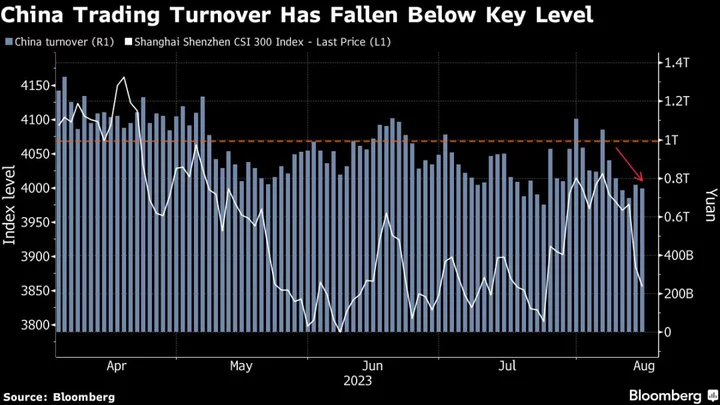Chinese authorities are considering cutting the stamp duty on stock trades for the first time since 2008, people familiar with the matter said, in what would be a major attempt to revive confidence in the world’s second-largest equity market.
Under the guidance of the State Council, regulators including the Ministry of Finance are discussing a draft proposal, said the people, asking not to be identified discussing a private matter. The details on timing and the size of a potential cut have yet to be determined and there’s no guarantee the proposal will be approved by senior leaders, the people added. The finance ministry and the China Securities Regulatory Commission didn’t respond to requests seeking comment.
Any reduction in China’s 0.1% stamp duty on stock trades has the potential to trigger a knee-jerk rally in the nation’s $9.9 trillion equity market, which is highly sensitive to policy shifts that impact market liquidity. A cut would be a boon for Chinese brokerages as well as quantitative hedge funds who use rapid-fire trading strategies.
More broadly, a rising equity market would help Xi Jinping’s government boost consumer and business confidence — seen as key to a sustainable rebound in the world’s second-largest economy.
A Bloomberg gauge of mainland brokerages erased losses and was up 0.7% as of 2:25 p.m. in Shanghai. The benchmark CSI 300 Index pared its decline to 0.2%.
With share prices languishing this year and household wealth taking a hit from the weak jobs market and falling property prices, authorities are coming under increased pressure to boost consumer spending and capital expenditure. Trading floors have been abuzz with speculation of a reduction in the stamp duty since Beijing issued a rare pledge last month to “invigorate capital markets and boost investor confidence.”
Read more: China Market Turmoil Amps Up Pressure for Policymakers to Act
Still, it’s unclear whether a cut would be enough to fuel a long-term rally in Chinese stocks. Data released on Tuesday showed rising unemployment and slowing growth in consumer spending, industrial output and investment. Stocks remained weak even after China’s central bank unexpectedly reduced a key interest rate by the most since 2020.
A two-month rebound in onshore equities has quickly fizzled out as global funds sold into the rally on concerns that the stimulus deployed so far won’t be enough to reverse the downdraft.
Read more: Rare China Vow on Market Support Puts Beijing’s Toolkit in Focus
The CSI 300 Index is little changed in 2023 after back-to-back annual losses, and is underperforming a broader gauge of Asian equities by about five percentage points. Chinese authorities are readying other measures to rejuvenate the market, with the Shanghai and Shenzhen stock exchanges weighing a move to change the size of bids to boost trading.
China has adjusted the stamp duty on stock trading several times in the past. In April 2008, the government slashed the levy to support the market after a plunge, helping spur a bull run the following year. In May 2007, it raised the rate to cool a rally that was drawing more than 300,000 new investors a day.
--With assistance from Charlotte Yang.
(Adds market performance in the fifth paragraph.)

